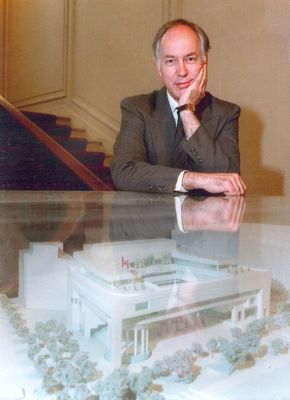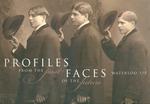Paul Heinbecker
Paul Heinbecker is a career diplomat respected around the world who
counts his experience as a star football player in Waterloo in the early
1960s as some of his best training for a life spent in foreign service.
Football and foreign policy?
Heinbecker, a former Canadian ambassador to the United Nations explained once: “In playing football, you learn to be determined, you learn to put up with things, you learn to be tough, you learn teamwork”.
Fittingly, Heinbecker returned to Waterloo in 2003 after spending a distinguished career in the top echelons of Canadian foreign policy making. He returned to take a position as the inaugural director of the Centre for Global Relations at Wilfrid Laurier University and another post as a Senior Research Fellow at the Centre for International Governance Innovation in Uptown Waterloo.
Upon his retirement from public service, one writer wondered whether Heinbecker’s remarkable success could be due in part to his years as a football player with the Wilfrid Laurier University Golden Hawks, or perhaps his working-class roots in a town that had “a strong work ethic and sense of community”.
“Perhaps it is the football player in him. He is a team player, but a competitive one with an awareness that risks can pay off in unexpected ways . . . Ambassador Heinbecker carries with him a perceptible level of empathy for those in need or without a voice, combined with a sense at both the individual and the international level that anything is possible.”
Heinbecker’s first foreign post was in Turkey in 1966, followed by stints in Stockholm and Paris before serving in Washington as a minister in the Canadian embassy. He wrote Prime Minister Trudeau’s peace initiative speech in 1983. In 1989, he became Prime Minister Brian Mulroney’s chief foreign policy advisor and speech writer. During the Mulroney years, Heinbecker helped form policy around such issues as the anti-apartheid campaign and the Free Trade Agreement.
Average Canadians likely got their first look at Heinbecker when he appeared in national media in March 2003 as Canada’s ambassador to the United Nations. Heinbecker was trying to avoid war in Iraq at the time and was articulating Canada’s compromise proposal.
Despite his distinguished diplomatic career, Heinbecker is also remembered locally as a star football player at St. Jerome’s high school, Waterloo Collegiate and Wilfrid Laurier University in the late 1950s and early 1960s.
“He was your all-American boy – in Canada,” a friend said.
Heinbecker once said, “All I ever wanted to do was play football. . . I don’t mean to sound casual about this but for as long as I can remember football was in my blood. I never thought about doing much else.”
The two worlds collided on a single day after he graduated from Wilfrid Laurier University in 1965 with a degree in English and history. That day he was made a first-round pick of the Edmonton Eskimos of the Canadian Football League and he got a job offer from the External Affairs Department in Ottawa.
Heinbecker chose Ottawa and soon moved to Turkey where he met his wife Ayse Komen. Heinbecker has said that meeting his wife and the birth of his two daughters were among the highlights of his life in public service.
Photo credit: Kitchener-Waterloo Record Photographic Negative Collection, University of Waterloo Library
Paul Heinbecker (Waterloo 150 Profile)
Description
- Creator
- Gallagher, Beth, Author
- Media Type
- Text
- Image
- Description
- To celebrate Waterloo's 150th anniversary, the Waterloo Public Library published a book called "Profiles from the Past, Faces of the Future." This book featured 150 profiles of people who helped make Waterloo what it is today. This is the digitized profile for Paul Heinbecker.
- Notes
- Please visit the Waterloo Public Library to enquire about physical copies of "Profiles from the Past, Faces of the Future."
The Waterloo 150 project was funded by a grant from the Waterloo Regional Heritage Foundation. Beth Gallagher wrote the profiles with the assistance of many research volunteers. Information for the profiles was gathered from a variety of sources from the community and the Ellis Little Local History Room. Notable sources include the Ellis Little Papers, newspaper clippings, local magazines and books. - Place of Publication
- Waterloo, Ontario
- Date of Publication
- 2007
- Subject(s)
- Personal Name(s)
- Heinbecker, Paul ; Mulroney, Brian ; Trudeau, Pierre Elliot ; Komen, Ayse
- Language of Item
- English
- Geographic Coverage
-
-
Ontario, Canada
Latitude: 43.4668 Longitude: -80.51639
-
- Copyright Statement
- Uses other than research or private study require the permission of the rightsholder(s). Responsibility for obtaining permissions and for any use rests exclusively with the user.
- Contact
- Waterloo Public LibraryEmail:askus@wpl.ca
Website:
Agency street/mail address:35 Albert Street, Waterloo, Ontario, Canada, N2L 5E2
- Full Text




